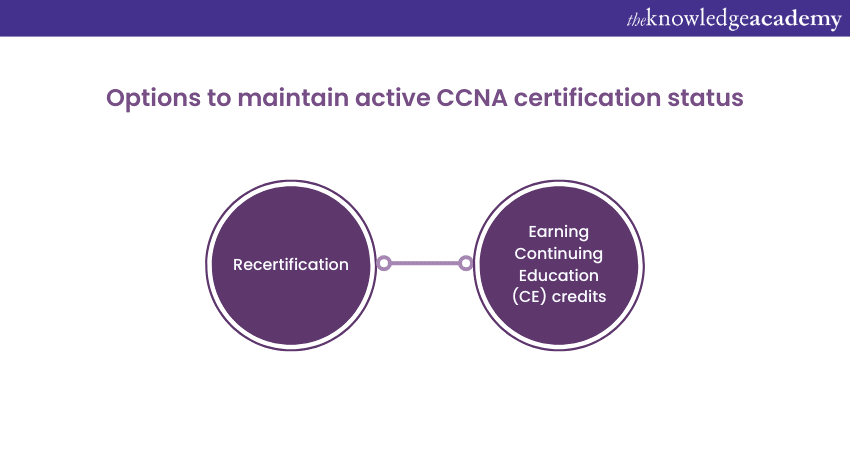We may not have the course you’re looking for. If you enquire or give us a call on +55 8000201623 and speak to our training experts, we may still be able to help with your training requirements.
We ensure quality, budget-alignment, and timely delivery by our expert instructors.

In today's rapidly evolving IT industry, staying updated with the latest networking technologies and acquiring relevant certifications has become essential for professionals aiming to advance their careers. One such sought-after certification is the Cisco Certified Network Associate (CCNA). In addition to acquiring it, understanding the CCNA Certification Validity and maintaining an active CCNA status is equally important.
Beyond its technical significance, CCNA certification holds numerous benefits for networking professionals. It provides industry recognition and enhances credibility, increasing the chances of securing desirable job opportunities.
In this blog, you will learn about the validity of a CCNA certification and what the CCNA certification renewal requirements are.
Table of Contents
1) CCNA certification: A brief introduction
2) Validity of CCNA certification
a) How to maintain an active CCNA status?
b) Recertification
c) Earning Continuing Education (CE) credits
3) Conclusion
CCNA certification: A brief introduction
Cisco Certified Network Associate (CCNA) is a globally recognised certification offered by a leading networking solutions provider – Cisco. The certificate offers the knowledge and skills required to install, configure, operate, and troubleshoot networks of organisations of various sizes.
In the realm of networking, CCNA is undoubtedly one of the highly valued certifications that reflects proficiency in foundational networking concepts and Cisco technologies. The presence of a CCNA qualification on one's resume can significantly enhance job prospects and open doors to exciting career opportunities.
Acquire the skills and knowledge to install and troubleshoot networks by signing up for our CCNA Training Courses now!
How to obtain a CCNA certification?
To earn a CCNA accreditation, one must pass the CCNA exam – 200-301 – offered by Cisco. It is a 120-minute exam that offers both single-answer and multiple-answer multiple-choice questions. The examination cost is £242.15. The topics of focus for the exam and its weightage are detailed in the CCNA 200-301 syllabus and are as follows:
1) Network fundamentals (20%): This section tests the foundational concepts of networking, IP addressing and subnetting, network topologies, and network devices.
2) Network access (20%): The network access section covers topics related to LAN switching technologies, Ethernet standards, wireless LANs, and configuring and troubleshooting network access control.
3) IP connectivity (25%): This section evaluates the ability to configure and troubleshoot IP connectivity, static routing, and troubleshooting techniques.
4) IP services (10%): This section covers additional network services and protocols like Domain Name System (DNS).
5) Security fundamentals (15%): This section handles network security concepts and implementing security measures to protect network infrastructure.
6) Automation and programmability (10%): For the DevNet track, there is a specific focus on automation and programmability in networking.

Validity of CCNA certification
CCNA Certification Validity lasts for three years from the date of achievement, and is not based on the issuance date of the certificate itself. So, the three-year effectiveness period begins once the candidate completes the necessary exam(s) and is awarded the CCNA accreditation
Understanding the validity period of CCNA certification is crucial for networking professionals to plan their career development effectively. As the certificate is valid for a specific duration, professionals need to consider the implications of an expiring certificate on their job prospects and career advancement. Additionally, understanding the benefits of CCNA certification aids in making informed decisions about maintaining and renewing it for better career opportunities.
Start your journey to becoming a Cisco Certified Network Associate with our CCNA Training (Cisco Certified Network Associate) Course today!
How to maintain an active CCNA status?

Maintaining an active CCNA status is of utmost importance for networking professionals as it demonstrates a commitment to continuous learning and professional growth. It showcases an individual's dedication to staying up to date with the latest industry trends and advancements.
Cisco provides two renewal options for professionals who wish to maintain an active CCNA certification status, and they are as follows:
Recertification
One way to renew CCNA certificate is by passing a more advanced Cisco certification exam within the same or different technology track. This approach allows networking professionals to deepen their knowledge and skills further while extending the validity of their certification. For effective recertification, consider CCNA exam tips to prepare for the advanced exams.
For example, a CCNA Routing and Switching certification holder can pursue a Professional-level certificate like Cisco Certified Network Professional (CCNP) Enterprise. Completing the higher-level exam automatically renews the CCNA certificate and remains valid for an additional three years.
Recertification through a higher-level exam also helps professionals stay updated with the latest networking technologies and industry best practices. If you wish to opt for recertification, you must pass any of the following exams:
1) CCNA exam 200-301: The first choice for any professional is to retake the 200-301 CCNA exam.
2) Associate exam: Cisco offers two associate exams - 200-901 DEVASC for Cisco Certified Devnet Associate and 200-201 CBROPS for Cisco Certified CyberOps Associate certification, and you are required to pass just one of them.
3) Technology core exam: There are five CCNP tracks – Enterprise, Security, Service provider, Data centre, and collaboration. Cisco provides a technology core exam for each of them.
4) Concentration exam: You are allowed to choose a professional concentration exam related to five of the CCNP certificates, Cisco Certified CyberOps Professional or Cisco Certified DevNet Professional.
5) Cisco Certified Internetwork Expert (CCIE) lab exam: The CCIE lab exam can only be taken upon passing a technology core exam. This is a rarely chosen option, but it helps recertify your previous certifications.
Earning Continuing Education (CE) credits
Cisco offers a Continuing Education Program that allows certified professionals to accumulate credits by participating in authorised training courses, webinars, conferences, or other educational activities. You require 40 CE credits to renew the CCNA certification.
The CE program offers a flexible and convenient way for professionals to stay updated with the latest networking technologies and advancements. It also provides opportunities for skill development while earning the required credits for CCNA recertification.
The number of credits required for renewal varies based on the certificate level and track. By earning the required number of continuing education credits within the three-year validity period, professionals can keep their CCNA certificate active.
Ready to simplify Cisco networking? Get the Cisco Packet Tracer Cheat Sheet now!
Conclusion
The CCNA certification is a valuable credential for networking professionals, and maintaining its active status is crucial for career growth and professional development. We hope this blog has helped you understand the importance of CCNA Certification Validity and the different renewal options.
Enhance your CCNA skills and ensure career progression. Sign up for our Cisco Packet Tracer Training Course today!
Upcoming IT Infrastructure & Networking Resources Batches & Dates
Date
 CCNA Certification
CCNA Certification
Mon 17th Mar 2025
Mon 26th May 2025
Mon 14th Jul 2025
Mon 22nd Sep 2025
Mon 24th Nov 2025
Mon 8th Dec 2025






 Top Rated Course
Top Rated Course


 If you wish to make any changes to your course, please
If you wish to make any changes to your course, please


